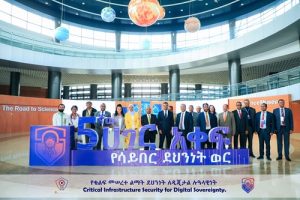BY KFLEEYESUS ABEBE
Africa, comprising developing countries with limited human power and financial capability, has been slow in the race of space satellite programmes. But these last two decades have showed its interest and potential in space science. Since the continent’s first satellite was launched more than 20 years ago, 44 have been sent into orbit by 13 African countries, according to consultancy Space in Africa.
Ethiopia, Egypt, South Africa, Kenya and Nigeria all now have satellite space. But while it’s cheaper, it is definitely not cheap. And people often ask whether this is money well spent or wasted.
The BBC World service recently aired a program on whether Africa needs its own satellite program and whether it can afford it. The program invited two African space engineers; Sias Mostert (PhD), a space scientist at the University of Stellenbosch in South Africa and Berhanu Bulcha (PhD), an Ethiopian-American NASA research engineer. Berhanu Bulcha (PhD), underlines how crucial space development is for Africa’s holistic development ambition.
“Countries in Africa definitely need their own satellites and some folks may think it’s a luxury but broadcasting connectivity, telecommunication or Internet services are becoming necessity for education, healthcare businesses such as banks and others. And if you really look at the numbers, only two fifth of the continent currently have internet. This is to low, more work need to be done, to catch up and to compete and today’s world stage.”
Berhanu suggests African countries can minimize cost of building space satellite and handling programmes by co-owining satellites. “If you really want to build a GPS satellite or communication satellites, which type we’re talking hundreds of million dollars. And, yes, that could be expensive, but there are ways to mitigate this and to own or jointly co owne satellites, which are important.”
Sias Mostert elaborates the multiple benefits of co-owning of satellites. “For the price of one satellite program, they get the benefit of four satellites. So it is not only co owning satellite but also the constellations of satellites. And now it is almost twenty years later. So today, one can conceive of constellations of multiple satellites. And with NANO satellites, those standardized cube SATS one can conceive of many more countries participating in a joint resource that is of use to Africa.” “In addition to alleviating social challenges, developing space instrument also inspires generation to have big dream,” Berhanu says.
“Actually, I look at it in a little bit different way. Developing space instrument will allow the new generation students to aspire and to dream big. In addition, developing space technology will open doors for innovation and allow alleviatete either social challenges in healthcare education and manufacturing. So, I mean, most of the things that we do here in the U. S. even if it has a direct application to the space, most of them are commercialized. We do patents and, you know, those technologies trickle down to the grassroots to address specific challenges. So and I think it has a white application more than the space application that’s commenting here.”
As Sias space programs aren’t ventures seen a luxury but they can be ways to support African governments struggle to fulfill basic demands of their citizens. Therefore, Sias insisted African governments to provide deserving focus for space development.
“It is really a fundamental question to the African government. Do you want to stop the brine drain? And if you want to stop the brine drain, then it is worth the effort to build an innovation economy in your country to assist with your factory economy, with mining, for example, or agriculture. There’s a lot of innovation required around the area these days. Or, the services economy to reach all the hospitals and clinics and all the schools in Africa, the six hundred thousand schools in Africa. Okay? How on earth are you going to do that if you don’t use space technology? And then of course, you can also reap the benefits of the innovation economy over time when you find that there’s a new unicorn being born somewhere in your country in Africa. So it is not all or for me, it is an end. You have to invest in the factory, the service and innovation economy.”
Dr.Berhanu indicates owning a satellite enables countries to provide sustainable access to information to their citizens, which is a basic right. “In most cases, in countries in Africa, they rely on leasing satellites. And as the demand of services with broadband, Internet connectivity is increasing. And in the continent of rising population, the cost of leasing is now sustainable, to be honest. So you really have to build it. Yes. It comes with a front cost and building human capacity there. But once you build it, not only actually you benefit your own nation, but also actually you start providing the service to every country in Africa.”
The two scienstis see a bright future of Africa in development, owning and utilization of space satellite programmes.
“So the future for space in Africa is from where I’m standing is extremely bright. There are a multitude of services that are needed. The geography of Africa is absolutely enormous compared to the developed countries, which have already established infrastructure, for communication, for broadcasting, for providing all the basic services that can goes with that like health and education, and space is about one of the few possibilities where you can reach everybody with the click of a finger. And the big question in my mind is why hasn’t it happened yet? In that sense, there is a bright future for space in Africa.”
Birhanu says there are already enthusiast young Africans to make a change and expects more satellites to be built and launched from countries in Africa.
“Yes. There’s a bright future for Africa as well. I share that for two reasons. Now with global connectivity, the young African students are very inspired to do new things. And this is actually important. Now what we need to give them is access to these things. For them to learn and you would see this in the next ten, fifteen years. They can turn that into actually something real. If they learn today, there would be the next generation leaders in space industry. So I am very hopeful. Hundreds of satellites would be built and launched from countries in Africa.”
When Neil Armstrong became the first person to set foot on the moon fifty years ago, he said: “That is one small step for man, and one giant leap for mankind.” And, with great interest and determination Africa can own its own space satellite programmes.
THE ETHIOPIAN HERALD 16 DECEMBER 2022





